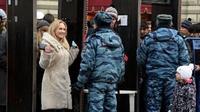-
A first: Constitutionality of NSA warrantless surveillance challenged by terrorism suspect
Jamshid Muhtorov, a refugee from Uzbekistan now facing terrorism charges in Colorado, is the first criminal defendant who, as part of his lawyers’ defense strategy, is challenging the constitutionality of the NSA’s warrantless surveillance program. Muhtorov filed a motion Wednesday in federal court in Denver to suppress any evidence obtained through the agency’s surveillance program on grounds that it was unlawful. In July 2013 the Justice Department reversed an earlier policy, and now informs defendants whether the case against them, in whole or in part, is based on information obtained through warrantless surveillance. To date, six months after the review process at Justice was launched, Muhtorov and Mohamed Mohamud, a Portland, Oregon teenager who had been convicted after an FBI sting operation of attempting to detonate a bomb at a Christmas tree lighting ceremony, are the only defendants to receive such a disclosure.
-
-
A first: Judge in terrorism case rules defense may examine government secret FISA application
U.S. District Judge Sharon Johnson Coleman ruled yesterday (Wednesday) that the U.S. government cannot keep secret its request to conduct clandestine surveillance of an accused would-be terrorist. The ruling gives defense attorneys an unprecedented access to a request made to the Foreign Intelligence Surveillance Act (FISA) court for permission to spy on an American citizen. Judge Coleman said her ruling is the first time a defendant’s lawyers will be given access to an application prosecutors submitted to the FISA court. Security experts warned that opening FISA applications to review in a criminal case may set a dangerous precedent.
-
-
Federal, state chemical safety agencies increasingly hampered by budget cuts
The budgets of state and federal agencies tasked with responding to the Elk River chemical spill have recently been cut, and these cuts have limited these agencies’ ability to prevent or respond to disasters such as the water crisis in West Virginia. “We do less,” said a CDC financial official, when asked the results of cuts. “What [the CDC director] has often been quoted as saying is that threats are not going down and so it is concerning to not be able to grow with the public health threats.”
-
-
Supreme Court: airlines not liable for exaggerating in describing possible air emergency
The U.S. Supreme Court on Monday ruled that when an airline reports to TSA about an individual who might pose a potential danger, the airline may not be held liable if its report contained exaggerations and minor falsehoods. Air Wisconsin terminated the employment of a pilot who failed several required tests, and who became extremely agitated and disruptive during the fourth, and last, test. In its report to TSA, the airline described the pilot as “mentally unstable.” The fired pilot sued the airline for describing him as mentally unstable, and a Colorado jury awarded him $1.2 million in damages. Justice Sonia Sotomayor, writing for the majority, said “a few inaptly chosen words” were not enough to support the verdict. “Baggage handlers, flight attendants, gate agents, and other airline employees who report suspicious behavior to the TSA should not face financial ruin if, in the heat of a potential threat, they fail to choose their words with exacting care,” she wrote. A federal law — the Aviation and Transportation Security Act of 2001 — gives airline employees broad immunity from lawsuits for reports of suspicious activities.
-
-
New anthrax-killing virus could offer new ways to detect, treat, and decontaminate anthrax bacillus
From a zebra carcass on the plains of Namibia in Southern Africa, researchers have discovered a new, unusually large virus (or bacteriophage) which infects the bacterium that causes anthrax. The novel bacteriophage could eventually open up new ways to detect, treat, or decontaminate the anthrax bacillus and its relatives that cause food poisoning. Bacteriophages are often highly specific to a particular strain of bacteria, and when they were first discovered in the early twentieth century there was strong interest in them as antimicrobial agents. The discovery of penicillin and other antibiotics, however, eclipsed phage treatments in the West, although research continued in the Soviet Union.
-
-
U.S. weapons shipped to moderate Syrian rebels after secret congressional approval
U.S. and European sources have confirmed that U.S.-manufactured light arm have been flowing to moderate Syrian rebels in the south of Syria, and that Congress has approved funding to continue the shipments for the next few months. The weapons, which are being delivered to the rebels through Jordan, include both light arms and heavier weapons such as anti-tank rockets. The shipments, however, do not include shoulder-fired anti-aircraft missiles.
-
-
Israeli jets destroy Hezbollah-bound advanced Russian missiles stored near Latakia
Large warehouses near the port city of Latakia, where the Assad regime stored advanced Russian missiles before shipping them to Hezbollah, were destroyed by aerial attack late Sunday. Israel has already launched six attacks in 2013 on Syrian arms shipments to Hezbollah — on 30 January, 3 May, 5 May, 5 July, 18 October, and 30 October. The attack on 5 July was on storage facilities in the same Latakia area, where Syria kept a large quantity of advanced P-800 Oniks anti-ship missiles, also called Yakhont missiles. Three weeks after the attack, U.S. sources said that the attack did not succeed in wiping out all of the missiles. “American officials said that further Israeli strikes are likely,” the New York Times reported on 31 July.
-
-
Russia imposes strict security measures on the Sochi region

In preparation for the 2014 Winter Olympics in the Black Sea resort city of Sochi, Russian authorities have been increasing security measures to discourage Islamist militants who have threatened to disrupt the games with “all means that Allah allows.” More than 70,000 soldiers and police officers will guard the Olympic facilities and the sprawling city of Sochi. In addition, Russia will be using SORM (System for Operative Investigative Activities) to monitor every mobile telephone call, e-mail, SMS, and Internet chats originating from or going into the Sochi region during the Games.
-
-
Value of list of state sponsors of terrorism questioned
The U.S. list of State Sponsors of Terrorism, created in 1979, originally included Libya, Iraq, South Yemen, and Syria. Cuba was added in 1982, Iran in 1984, North Korea in 1988, and Sudan in 1993. The list currently contains four countries — Cuba, Iran, Sudan, and Syria. Experts question the value of the list, since the four countries listed are not the only countries that currently support, engage in, or ignore acts of terrorism, according to news reports from the State Department, and the inclusion of Cuba has more to do with U.S. domestic politics than Cuba’s current policies, as the State Department’s 2012 Country Report on Terrorismconcluded that “There was no indication that the Cuban government provided weapons or paramilitary training to terrorist groups.”
-
-
Minnesota wants to limit law-enforcement use of wireless tracking devices
The Minnesota Department of Public Safety’s acquisition of Kingfish and Stingray II wireless surveillance devices has come under scrutiny as the department’s Bureau of Criminal Apprehension(BCA) has used the devices in investigations. Some legislators are considering placing limits on law enforcement’s use of the data captured by the devices because of concerns over who has access to the data and how long it is being kept.
-
-
Israel facing a growing al-Qaeda challenge

What appears to be the first al Qaeda plot against targets inside Israel was thwarted last December when the Israeli security services arrested three Palestinians — two of them East Jerusalem residents with Israeli identification cards — who planned simultaneous attacks on the International Conference Center in Jerusalem and the U.S. embassy in Tel Aviv. The three men were arrested on 25 December, but a court-ordered gag order was lifted last Wednesday. Analysts say that the growing influence of al Qaeda affiliates in Iraq and Syria, the foothold the organization has gained in the Sinai Peninsula, and the growing presence of Salafists in the West Bank, made it only a question of time before al-Qaeda-inspired terrorist acts against Israeli targets would be hatched.
-
-
U.K. terror suspects protected by anonymity rules
Two U.K. terror suspects – one an al-Qaeda recruiter, the other involved in the Nairobi shopping mall attack last year – escaped British detention in 2007, but are still protected by court-imposed anonymity orders. Seven men suspected of terrorism will be released into the community in the next few weeks when the control measures restricting their movements expire. These men, too, will benefit from court-ordered anonymity. Security experts say that as is the case with two suspects who absconded in 2007, some or all of the seven terrorism suspects will be in a position to evade surveillance by using their anonymity.
-
-
Expert calls for “surveillance minimization” to restore public trust
Surveillance minimization — where surveillance is the exception, not the rule — could help rebuild public trust following revelations about the collection of personal data, according to an expert on privacy and surveillance. “Surveillance minimization requires surveillance to be targeted rather than universal, controlled and warranted at the point of data gathering rather than of data access, and performed for the minimum necessary time on the minimum necessary people,” he says.
-
-
USAF nuclear-missile officers alleged to have regularly cheated on readiness tests

Three former U.S. Air Force officers have alleged that USAF officers responsible for operating nuclear-armed missiles at Malmstrom Air Base in Montana have, for many years, been cheating on monthly readiness tests, and were never punished for it. The former officers claim that cheating is the norm and that officers who did otherwise are the exception.The officers who made the allegations added, though, that misconduct on tests did not impair the safety of the nuclear weapons or the Air Force’s ability to launch missiles if ordered.
-
-
Florida teenager faces bioterrorism charges
Jesse Korff, 19, of Labelle, Florida is facing federal charges in New Jersey for selling poison through a black marketplace on the underground Internet. Law enforcement says from November 2013 through 15 January this year, Korff produced, stockpiled, and sold abrin for use as a weapon. The Center for Disease Control and Prevention (CDC) considers abrin, which is extracted from the seeds of the rosary pea plant, a subset of biological agents and toxins posing a threat to public health and safety. Small doses of abrin are potentially lethal to humans if ingested, inhaled, or injected.
-
More headlines
The long view
What Does Netflix’s Drama “Adolescence” Tell Us About Incels and the Manosphere?
While Netflix’s psychological crime drama ‘Adolescence’ is a work of fiction, its themes offer insight into the very real and troubling rise of the incel and manosphere culture online.
A Shining Star in a Contentious Legacy: Could Marty Makary Be the Saving Grace of a Divisive Presidency?
While much of the Trump administration has sparked controversy, the FDA’s consumer-first reforms may be remembered as its brightest legacy. From AI-driven drug reviews to bans on artificial dyes, the FDA’s agenda resonates with the public in ways few Trump-era policies have.
The Center Can Hold — States’ Rights and Local Privilege in a Climate of Federal Overreach
As American institutions weather the storms of executive disruption, legal ambiguity, and polarized governance, we must reexamine what it means for “the center” to hold.
How to Reverse Nation’s Declining Birth Rate
Health experts urge policies that buoy families: lower living costs, affordable childcare, help for older parents who want more kids
Foundation for U.S. Breakthroughs Feels Shakier to Researchers
With each dollar of its grants, the National Institutes of Health —the world’s largest funder of biomedical research —generates, on average, $2.56 worth of economic activity across all 50 states. NIH grants also support more than 400,000 U.S. jobs, and have been a central force in establishing the country’s dominance in medical research. Waves of funding cuts and grant terminations under the second Trump administration are a threat to the U.S. status as driver of scientific progress, and to the nation’s economy.
The True Cost of Abandoning Science
“We now face a choice: to remain at the vanguard of scientific inquiry through sound investment, or to cede our leadership and watch others answer the big questions that have confounded humanity for millennia —and reap the rewards.”
